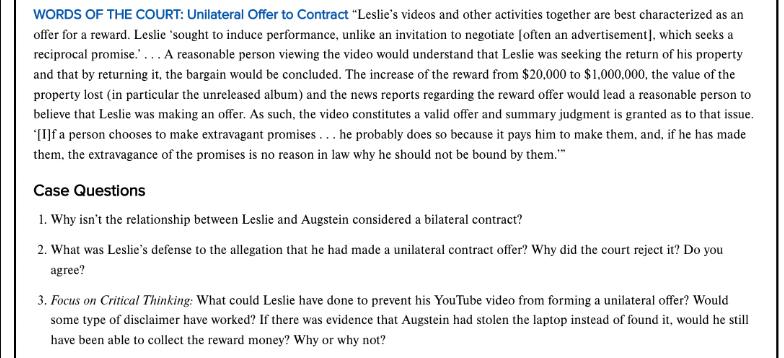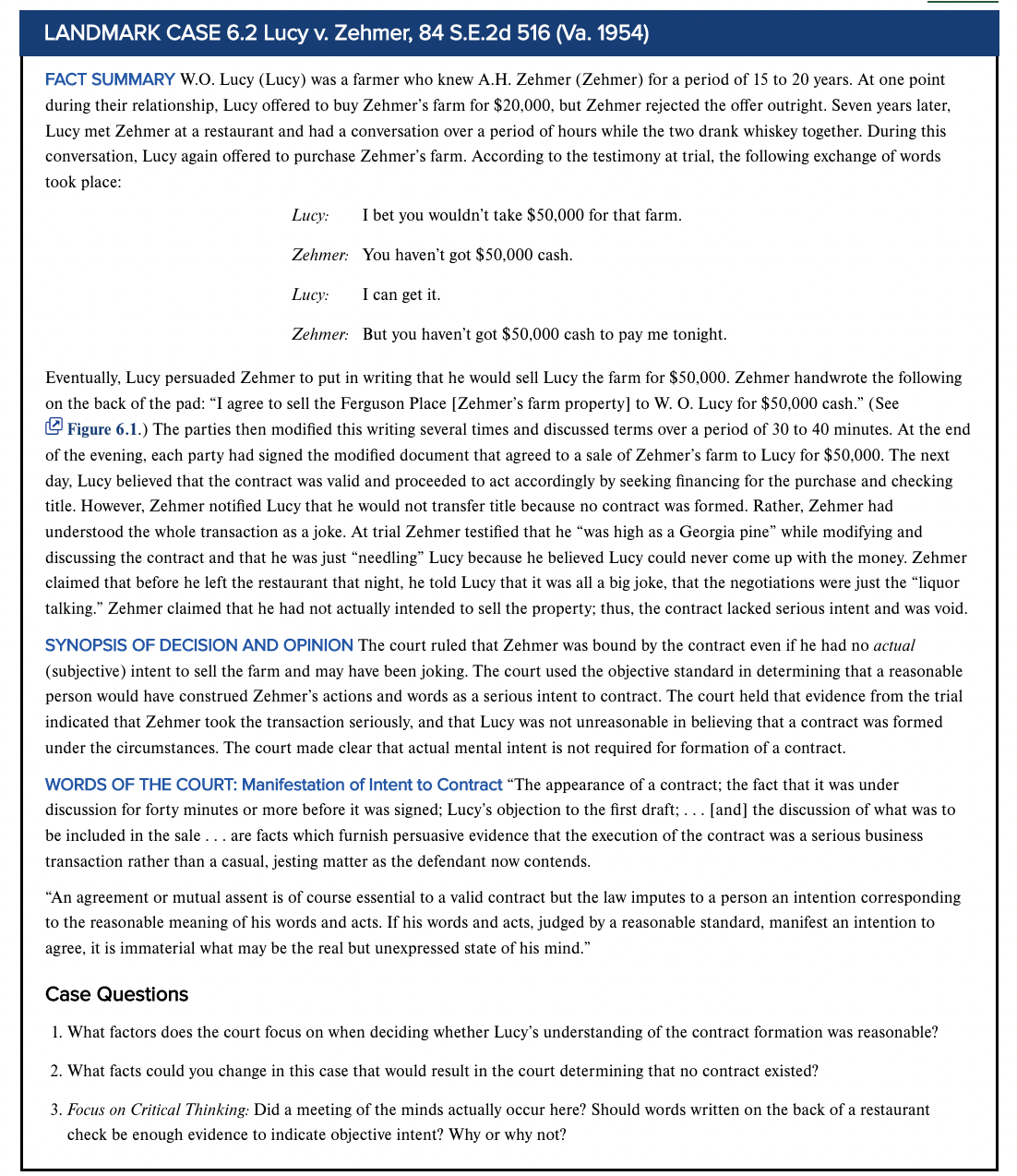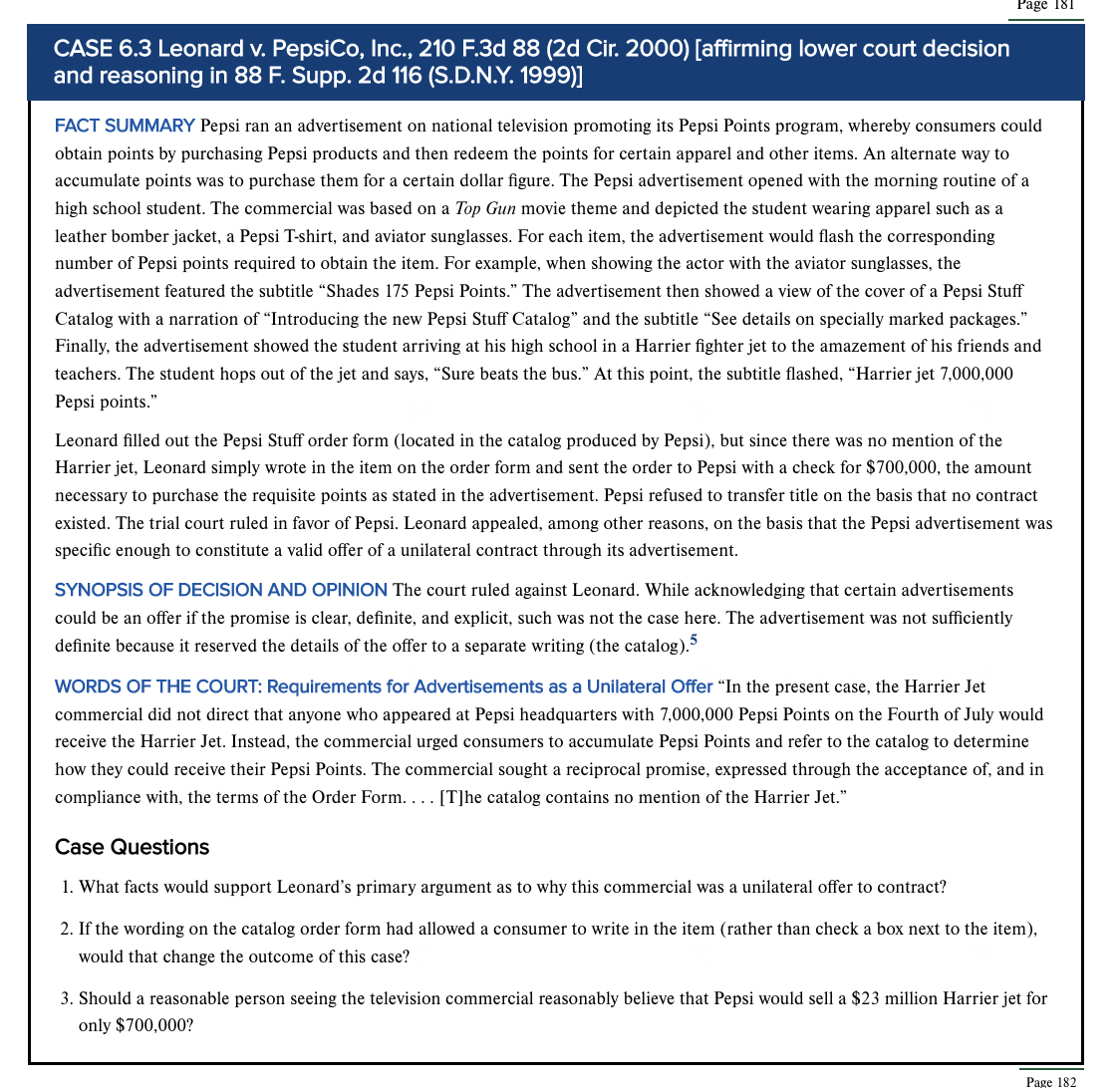Answered step by step
Verified Expert Solution
Question
1 Approved Answer
Ryan Leslie (Leslie) is an American recording artist and NextSelection is a company that owns the trademark to Leslie's name and performances. While on




Ryan Leslie (Leslie) is an American recording artist and NextSelection is a company that owns the trademark to Leslie's name and performances. While on tour in Germany, Leslie's laptop computer, external hard drive, and certain other belongings were stolen. The laptop contained valuable and confidential intellectual property, including music and videos related to Leslie's records and performances. In videos, news articles, and online postings, Leslie stated that he would pay a reward to anyone who returned his property. Specifically, Leslie mentioned a $20,000 reward for the return of his property in a YouTube video, saying, "I am offering a reward of $20,000." On November 6, 2010, a video was posted increasing the reward to $1,000,000. At the end of the video, a message reads In the interest of retrieving the invaluable intellectual property contained on his laptop & hard drive, Mr. Leslie has increased the reward offer from $20,000 to $1,000,000 USD. The increase of the reward was publicized on Leslie's Facebook and Twitter accounts, including a post on Twitter that read, "I'm absolutely continuing my Euro tour + I raised the reward for my intellectual property to $1mm," and that included a link to the video on YouTube. News organizations also published reports on Leslie's reward offer, both in print and online. Finally, Leslie was interviewed on MTV in November 2010, at which time he reiterated the $1,000,000 reward, saying, "I got a million dollar reward for anybody that can return all my intellectual property to me." Approximately one month later, Armin Augstein (Augstein) found the laptop in a plastic garbage bag while walking his dog in a German city. He returned the laptop and hard drive to the local police and eventually the laptop was returned to Leslie in New York. When Augstein contacted Leslie, however, Leslie refused to pay the reward. Leslie alleged that the intellectual property for which he valued the laptop was not present on the hard drive when it was returned. Augstein filed suit and asked the court to grant summary judgment on whether Leslie's various promises constituted a unilateral offer of a reward for the return of his property-an offer that Augstein accepted and fully performed when he presented the property to the police in Germany. Leslie responded that no offer existed because a reasonable person would not have understood the mention of the reward to be an offer of a unilateral contract, but instead would have understood it to be an invitation to negotiate. Moreover, Leslie argued, even assuming that it was an offer, Augstein did not perform because he did not return the intellectual property, only the physical property. SYNOPSIS OF DECISION AND OPINION The U.S. District Court for the Southern District of New York ruled in favor of Augstein, holding that Leslie's various reward videos and statements constituted a unilateral offer to contract. The court reasoned that Leslie's attempts to publicize the reward through social and public media were sufficiently detailed to create an objective belief that anyone who performed by returning the laptop would be paid the promised reward money. The court rejected Leslie's contention that the videos were merely an advertisement because Leslie was not seeking a promise from an individual who would return his belongings. Rather he was seeking performance-the actual return of his property. In addition, the court pointed out that his videos and other commentary cannot be reasonably understood as an invitation to negotiate because, similarly, Leslie was not soliciting help in finding his property, but the actual return itself. WORDS OF THE COURT: Unilateral Offer to Contract "Leslie's videos and other activities together are best characterized as an offer for a reward. Leslie 'sought to induce performance, unlike an invitation to negotiate [often an advertisement], which seeks a reciprocal promise.... A reasonable person viewing the video would understand that Leslie was seeking the return of his property and that by returning it, the bargain would be concluded. The increase of the reward from $20,000 to $1,000,000, the value of the property lost (in particular the unreleased album) and the news reports regarding the reward offer would lead a reasonable person to believe that Leslie was making an offer. As such, the video constitutes a valid offer and summary judgment is granted as to that issue. [I]f a person chooses to make extravagant promises... he probably does so because it pays him to make them, and, if he has made them, the extravagance of the promises is no reason in law why he should not be bound by them."" Case Questions 1. Why isn't the relationship between Leslie and Augstein considered a bilateral contract? 2. What was Leslie's defense to the allegation that he had made a unilateral contract offer? Why did the court reject it? Do you agree? 3. Focus on Critical Thinking: What could Leslie have done to prevent his YouTube video from forming a unilateral offer? Would some type of disclaimer have worked? If there was evidence that Augstein had stolen the laptop instead of found it, would he still have been able to collect the reward money? Why or why not? LANDMARK CASE 6.2 Lucy v. Zehmer, 84 S.E.2d 516 (Va. 1954) FACT SUMMARY W.O. Lucy (Lucy) was a farmer who knew A.H. Zehmer (Zehmer) for a period of 15 to 20 years. At one point during their relationship, Lucy offered to buy Zehmer's farm for $20,000, but Zehmer rejected the offer outright. Seven years later, Lucy met Zehmer at a restaurant and had a conversation over a period of hours while the two drank whiskey together. During this conversation, Lucy again offered to purchase Zehmer's farm. According to the testimony at trial, the following exchange of words took place: Lucy: I bet you wouldn't take $50,000 for that farm. Zehmer: You haven't got $50,000 cash. Lucy: I can get it. Zehmer: But you haven't got $50,000 cash to pay me tonight. Eventually, Lucy persuaded Zehmer to put in writing that he would sell Lucy the farm for $50,000. Zehmer handwrote the following on the back of the pad: "I agree to sell the Ferguson Place [Zehmer's farm property] to W. O. Lucy for $50,000 cash." (See Figure 6.1.) The parties then modified this writing several times and discussed terms over a period of 30 to 40 minutes. At the end of the evening, each party had signed the modified document that agreed to a sale of Zehmer's farm to Lucy for $50,000. The next day, Lucy believed that the contract was valid and proceeded to act accordingly by seeking financing for the purchase and checking title. However, Zehmer notified Lucy that he would not transfer title because no contract was formed. Rather, Zehmer had understood the whole transaction as a joke. At trial Zehmer testified that he "was high as a Georgia pine" while modifying and discussing the contract and that he was just "needling" Lucy because he believed Lucy could never come up with the money. Zehmer claimed that before he left the restaurant that night, he told Lucy that it was all a big joke, that the negotiations were just the "liquor talking." Zehmer claimed that he had not actually intended to sell the property; thus, the contract lacked serious intent and was void. SYNOPSIS OF DECISION AND OPINION The court ruled that Zehmer was bound by the contract even if he had no actual (subjective) intent to sell the farm and may have been joking. The court used the objective standard in determining that a reasonable person would have construed Zehmer's actions and words as a serious intent to contract. The court held that evidence from the trial indicated that Zehmer took the transaction seriously, and that Lucy was not unreasonable in believing that a contract was formed under the circumstances. The court made clear that actual mental intent is not required for formation of a contract. WORDS OF THE COURT: Manifestation of Intent to Contract "The appearance of a contract; the fact that it was under discussion for forty minutes or more before it was signed; Lucy's objection to the first draft; . . . [and] the discussion of what was to be included in the sale... are facts which furnish persuasive evidence that the execution of the contract was a serious business transaction rather than a casual, jesting matter as the defendant now contends. "An agreement or mutual assent is of course essential to a valid contract but the law imputes to a person an intention corresponding to the reasonable meaning of his words and acts. If his words and acts, judged by a reasonable standard, manifest an intention to agree, it is immaterial what may be the real but unexpressed state of his mind." Case Questions 1. What factors does the court focus on when deciding whether Lucy's understanding of the contract formation was reasonable? 2. What facts could you change in this case that would result in the court determining that no contract existed? 3. Focus on Critical Thinking: Did a meeting of the minds actually occur here? Should words written on the back of a restaurant check be enough evidence to indicate objective intent? Why or why not? Page 181 CASE 6.3 Leonard v. PepsiCo, Inc., 210 F.3d 88 (2d Cir. 2000) [affirming lower court decision and reasoning in 88 F. Supp. 2d 116 (S.D.N.Y. 1999)] FACT SUMMARY Pepsi ran an advertisement on national television promoting its Pepsi Points program, whereby consumers could obtain points by purchasing Pepsi products and then redeem the points for certain apparel and other items. An alternate way to accumulate points was to purchase them for a certain dollar figure. The Pepsi advertisement opened with the morning routine of a high school student. The commercial was based on a Top Gun movie theme and depicted the student wearing apparel such as a leather bomber jacket, a Pepsi T-shirt, and aviator sunglasses. For each item, the advertisement would flash the corresponding number of Pepsi points required to obtain the item. For example, when showing the actor with the aviator sunglasses, the advertisement featured the subtitle "Shades 175 Pepsi Points." The advertisement then showed a view of the cover of a Pepsi Stuff Catalog with a narration of "Introducing the new Pepsi Stuff Catalog" and the subtitle "See details on specially marked packages." Finally, the advertisement showed the student arriving at his high school in a Harrier fighter jet to the amazement of his friends and teachers. The student hops out of the jet and says, "Sure beats the bus." At this point, the subtitle flashed, Harrier jet 7,000,000 Pepsi points." Leonard filled out the Pepsi Stuff order form (located in the catalog produced by Pepsi), but since there was no mention of the Harrier jet, Leonard simply wrote in the item on the order form and sent the order to Pepsi with a check for $700,000, the amount necessary to purchase the requisite points as stated in the advertisement. Pepsi refused to transfer title on the basis that no contract existed. The trial court ruled in favor of Pepsi. Leonard appealed, among other reasons, on the basis that the Pepsi advertisement was specific enough to constitute a valid offer of a unilateral contract through its advertisement. SYNOPSIS OF DECISION AND OPINION The court ruled against Leonard. While acknowledging that certain advertisements could be an offer if the promise is clear, definite, and explicit, such was not the case here. The advertisement was not sufficiently definite because it reserved the details of the offer to a separate writing (the catalog).5 WORDS OF THE COURT: Requirements for Advertisements as a Unilateral Offer "In the present case, the Harrier Jet commercial did not direct that anyone who appeared at Pepsi headquarters with 7,000,000 Pepsi Points on the Fourth of July would receive the Harrier Jet. Instead, the commercial urged consumers to accumulate Pepsi Points and refer to the catalog to determine how they could receive their Pepsi Points. The commercial sought a reciprocal promise, expressed through the acceptance of, and in compliance with, the terms of the Order Form. . . . [T]he catalog contains no mention of the Harrier Jet." Case Questions 1. What facts would support Leonard's primary argument as to why this commercial was a unilateral offer to contract? 2. If the wording on the catalog order form had allowed a consumer to write in the item (rather than check a box next to the item), would that change the outcome of this case? 3. Should a reasonable person seeing the television commercial reasonably believe that Pepsi would sell a $23 million Harrier jet for only $700,000? Page 182
Step by Step Solution
There are 3 Steps involved in it
Step: 1

Get Instant Access to Expert-Tailored Solutions
See step-by-step solutions with expert insights and AI powered tools for academic success
Step: 2

Step: 3

Ace Your Homework with AI
Get the answers you need in no time with our AI-driven, step-by-step assistance
Get Started


